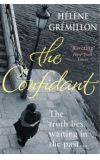
02 Oct 2012 02:32:50
It's difficult to imagine a more intensely French novel than this. In 1975 Camille finds a long letter among the notes of condolence sent following her mother's death. The letter doesn't seem to be intended for her but, as more letters follow, the story that pieces itself together could scarcely matter more to her. In the telling of this story, which begins just before France is engulfed by the second world war, the novel employs narrative devices of ancient pedigree: epistolary confessions, successive accounts of the same events seen through different eyes, a notebook containing a feverish transcript of still further confessions. If you were to unfold this literary origami too clinically, it might be found to have holes in it, but suspend your disbelief and revel in a heady tale of barren wombs, jealousy, betrayal and death. The author is at pains to pin her plot to specific days in the tumultuous history of Paris's downfall, but such is its complexity that the many dates risk confounding the reader. Better just to lie back and think of France.

